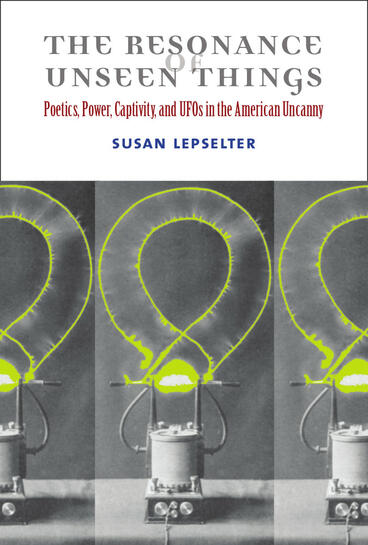The Resonance of Unseen Things
Poetics, Power, Captivity, and UFOs in the American Uncanny
An interdisciplinary study of how conspiracy theories and stories persist and resonate among different Americans
Description
The Resonance of Unseen Things offers an ethnographic meditation on the “uncanny” persistence and cultural freight of conspiracy theory. The project is a reading of conspiracy theory as an index of a certain strain of late 20th-century American despondency and malaise, especially as understood by people experiencing downward social mobility. Written by a cultural anthropologist with a literary background, this deeply interdisciplinary book focuses on the enduring American preoccupation with captivity in a rapidly transforming world. Captivity is a trope that appears in both ordinary and fantastic iterations here, and Susan Lepselter shows how multiple troubled histories—of race, class, gender, and power—become compressed into stories of uncanny memory.
“We really don’t have anything like this in terms of a focused, sympathetic, open-minded ethnographic study of UFO experiencers. . . . The author’s semiotic approach to the paranormal is immensely productive, positive, and, above all, resonant with what actually happens in history.”
—Jeffrey J. Kripal, J. Newton Rayzor Professor of Religion, Rice University
“Lepselter relates a weave of intimate alien sensibilities in out-off-the-way places which are surprisingly, profoundly, close to home. Readers can expect to share her experience of contact with complex logics of feeling, and to do so in a contemporary America they may have thought they understood.”
—Debbora Battaglia, Mount Holyoke College
“An original and beautifully written study of contemporary American cultural poetics. . . . The book convincingly brings into relief the anxieties of those at the margins of American economic and civic life, their perceptions of state power, and the narrative continuities that bond them to histories of violence and expansion in the American West.”
—Deirdre de la Cruz, University of Michigan
Susan Lepselter is an Associate Professor in the Departments of Anthropology and American Studies at Indiana University.
Reviews
“We really don’t have anything like this in terms of a focused, sympathetic, open-minded ethnographic study of UFO experiencers. . . . The author’s semiotic approach to the paranormal is immensely productive, positive, and, above all, resonant with what actually happens in history.”
—Jeffrey J. Kripal, J. Newton Rayzor Professor of Religion, Rice University
“Lepselter relates a weave of intimate alien sensibilities in out-of-the-way places which are surprisingly, profoundly, close to home. Readers can expect to share her experience of contact with complex logics of feeling, and to do so in a contemporary America they may have thought they understood.”
—Debbora Battaglia, Mount Holyoke College
“An original and beautifully written study of contemporary American cultural poetics.”
—Deirdre de la Cruz, University of Michigan
News, Reviews, Interviews
Read: Susan Lepselter interviewed on WBUR's On Point Link | 1/2/2018

